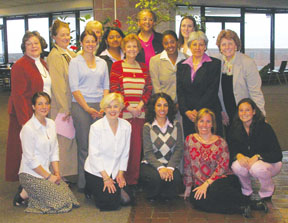BY YASUHITO YAMAMOTOStaff Writer
Since the Terri Schiavo case, public interest in living wills has dramatically increased. Subsequently, many newspapers ran editorials about the importance of having a living will. Recently, students at UMass Boston engaged in a discussion of this and related issues.
On April 27, the members of the advanced practice seminar in Aging and Human Services ran a workshop on living wills entitled, “If I Can’t Speak, Who Will Speak for Me?”
The issue of living wills emerged as the nation watched Terri Schiavo’s husband and legal guardian, Michael Schiavo, make the decision to remove the feeding tube that kept her alive in a persistent vegetative state (PVS) for eight years. While Michael claimed Terri had previously told him she wished not to be kept alive in a vegetative state, Terri’s parents argued that she has never mentioned such a desire to her family or friends. Had Terri written a living will, she would have received the type of health care she desired. More importantly, according to legal experts, the ensuing court battles could have been avoided.
Last week’s workshop reflected on the case. Presenters insisted on the importance and the right to have personal preferences with regards to medical care. Presenters then introduced the Five Wishes Living Will.
Five Wishes is a document valid in 36 states, as well as the District of Columbia. It is the first living will that addresses patients’ personal, emotional, and spiritual needs as well as medical wishes.
The document is divided into five sections: 1) choosing a health care agent; 2) medical treatment; 3) comfort care; 4) personal care; 5) final preparations. Members of the seminar presented their research on each section in detail.
“Wish Number One would be the most important part,” explained a presenter. “It is a legal statement and can’t be changed by other people.” The presenter assessed that Wish Number One is more than just a wish, it is a person’s right to have the desired health care agent.
According to a handout, if the writer of the will did not name a health care agent, the decision then falls to the relatives.
On the surface, this may not appear problematic. However, considering Terri Schiavo’s case, the writer of the will may want to have an agent s/he trusts so that the wishes can be carried out.
Even if one doesn’t plan to currently complete Five Wishes, it provides people the avenue to think about these issues and realize new values in them.
“Before doing Five Wishes, I just thought my husband and my relatives as my health care proxy and there would be no problem,” said Beth Clemens, a professor who worked to organize this seminar. “Going through a process of Five Wishes, I revaluated how much I can trust them.”
Many members of the audience felt informed by the presentation and decided to complete Five Wishes for themselves. The outcome is a trust discovered, often neglected in our daily lives.
While audience members were enthusiastic about the issue, they expressed criticisms about Five Wishes as well. “I think there is much space to improve Five Wishes,” said a member of the seminar. “Five Wishes is created by a person who worked closely with Mother Teresa, so it is Christian value-based and could be exclusive for many people.”
Indeed, when looking through Five Wishes, the sections were mainly based on what and how an individual wants things to be. Yet, in many cultures, things are decided between community members. Matters are rarely decided simply on a personal level.
In addition, the front page of Five Wishes asks for a Social Security number, which many U.S. residents don’t have. Five Wishes is also only published in English.
Clemens believes providing a Social Security number is not mandatory. Nonetheless, she agreed that Five Wishes is “designed primarily for U.S. citizens.”
To order copies of Five Wishes, call 1-888-5-WISHES. For more information, visit Aging with Dignity’s website, www.agingwithdignity.org, or contact Professor Clemens at [email protected] or call 617.287.7379.





















































